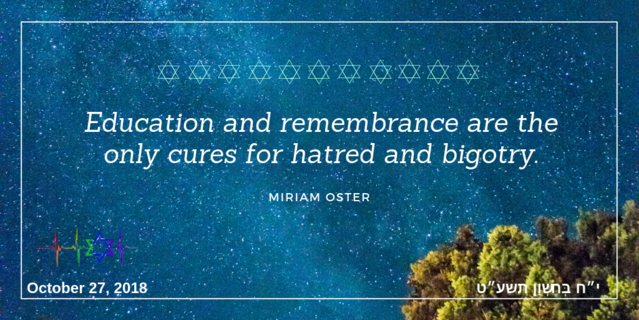Grief
Responding to the Pittsburgh Shooting
Pulse and Pittsburgh: When global communities are targeted in mass shootings
Posted October 31, 2018
During the early morning hours of June 12, 2016, a gunman entered the Pulse Nightclub in Orlando, Florida. Over a span of nearly four hours, the shooter terrorized a club filled with approximately 320 predominantly queer Latinx clubbers. In the end, 49 people were killed. At the time, it was the largest civilian mass shooting in the history of the United States. Less than 15 months later it would be 'outdone' by the Las Vegas shooting, which killed 59 individuals attending an outdoor country music event. There have been other shootings in the USA since then, but this past weekend's shooting at the Tree of Life Congregation Synagogue, which claimed the lives of 11 individuals, ranging in age from 54 to 97, seems more reminiscent of the Pulse shooting than others have.
Why?
On the surface, 11 senior citizens gathered for Shabbat services on a Saturday morning couldn't be more different than a group of queers attending a Latin dance club on a Saturday evening. There are some reports that the Pulse shooter made homophobic remarks during the shooting, but others have claimed that he was unaware of the nature of the club and simply picked it at random. Conversely, it would appear that there is not even a hint of doubt concerning the motives behind the Pittsburgh shooting, with multiple reports indicating that the shooter declared "All Jews Must Die" when he entered the Synagogue.
Despite these potential differences, I also sense some deeper similarities. Synagogues and other houses of worship are considered sanctuaries: places of refuge or safety. For members of the LGBTQ community, who were often rejected by their own religions, dance clubs and gay bars became their sanctuaries. The gay bar was the place where they could seek refuge from a hostile world. They were the places where they could hold their partner's hand and where two men or two women could dance together and see their reflection in everyone else on the dance floor. Gay bars were the places that people went when they were kicked out of their homes by their parents and were the sanctuaries for those who had been kicked out of their own houses of worship for being sinners. Pulse was undeniably a place of refuge and safety for the queer Latinx community of Orlando, Florida, just as the Tree of Life Congregation Synagogue was a place of refuge and safety for the Jewish community of Squirrel Hill. In other words, both of these shootings took place within sanctuaries where people sought refuge from the world, where they felt safe, and where they came to celebrate, mourn, and - at the most basic level - connect with humanity.
Both of these shootings targeted minority communities that face daily discrimination. Hate crime data in the United States consistently reports that anti-Semitic and anti-LGBTQ hate crimes are prevalent. In 2016, 54% of religiously motivated hate-crimes were anti-Semitic. In the same year, one in every 5 hate crimes was based on someone's sexual or gender identity. While there may be some debate as to precise motives, to LGBTQ people around the globe, Pulse was an attack on their very identities, just as Jewish people around the globe are now grieving an attack on their identity, culture, and religion.
After the Pulse shooting, a colleague and I collected LGBTQ people's responses. We asked them how they felt in the wake of the shooting, whether it had changed any of their opinions on related 'hot-button' issues, and how their friends and family were responding. Over 300 people from around the world shared their stories, and what tied them together was an experience of collective grief: a sense that the loss was theirs, that it was personal, and that it could have just as easily been them. More than 84% of the respondents described the shooting as having an impact on how safe they felt as an LGBTQ person, even if they lived thousands of miles away.
Some respondents were perplexed by their grief, wondering why they were having such a strong reaction to an event that technically did not involve them personally. Some went so far as to question whether they had the right to feel the grief that they felt, as though they were somehow trespassing on the grief of those who lost a loved one. Others spoke of how the event 'burst their bubble' or made them realize that they could be killed just for being who they are, or loving who they love. For many younger participants, the shooting was the first time that they really experienced this kind of connection between homophobia and their own potential mortality. On the other hand, older participants experienced the shooting as a reminder of past violence and a warning that they cannot become complacent.
Many also spoke of how they felt that it 'could have been them.' Some were at other gay nightclubs that night, others had been to Pulse in the past. Ultimately it was the knowledge that a place that was supposed to be a safe haven could be turned into a gruesome murder scene that shook people to their core. More than one participant described the loss in terms of losing 'brothers and sisters.'
Although much of what people spoke about was related to pain and loss, there was also an underlying message of resilience and strength. Many spoke of the need to double down on efforts to fight prejudice. One respondent described their feelings by saying "first it upset me, then it angered me. Now, it's mobilized me." While some indicated that they were more hesitant about attending pride events, the majority felt more inclined than ever to attend pride so that they could be visible to the world.
Quite a few participants attended vigils and described wanting to be with other members of the LGBTQ community. Often this was linked to feeling that their non-LGBTQ friends and family did not understand the meaning and impact of the shooting. To those outside the LGBTQ community, Pulse was just another shooting, special perhaps only because, for a short duration in time, it was the largest shooting. The disconnect between how LGBTQ people felt and how their friends and family saw it as 'just another shooting' seemed to exacerbate respondents' grief and feelings of isolation.
I can't help but wonder if members of the Jewish community are not now experiencing many of the same sentiments described above. These events are clearly different, but they are also the same. The feelings of loss are immeasurable, and those feelings will hit harder for those more connected to the targeted community than others. Both of these shootings were motivated by hatred, and hatred of one kind tends to hang out with hatred of other types. People who are higher in one kind of prejudice are often higher in others as well, and it is rare for someone to only possess a single prejudice. Thus, when hatred and prejudice strike one community, we must all stand up against it as though it was our own community. No community should feel alone in a time of grief.

References
Blair, K. L. (2017). Did Secretary Clinton lose to a ‘basket of deplorables’? An examination of Islamophobia, homophobia, sexism and conservative ideology in the 2016 US presidential election. Psychology & Sexuality, 8(4), 334-355.
Federal Bureau of Investigation. (2018). Hate Crimes. https://www.fbi.gov/investigate/civil-rights/hate-crimes
Hodson, G., Choma, B. L., Boisvert, J., Hafer, C. L., MacInnis, C. C., & Costello, K. (2013). The role of intergroup disgust in predicting negative outgroup evaluations. Journal of Experimental Social Psychology, 49(2), 195-205.
Hoskin, R.A. & Blair, K.L. (2017). Collective Grief and Global LGBTQ Responses to the Pulse Nightclub Shooting. Canadian Psychological Association, Annual Meeting.
Meuleman, B., Abts, K., Slootmaeckers, K., & Meeusen, C. (2018). Differentiated Threat and the Genesis of Prejudice: Group-Specific Antecedents of Homonegativity, Islamophobia, Anti-Semitism, and Anti-Immigrant Attitudes. Social Problems.
Stapleton, A., & Ellis, R. (2016). Timeline of Orlando nightclub shooting. CNN, https://www.cnn.com/2016/06/12/us/orlando-shooting-timeline/index.html




